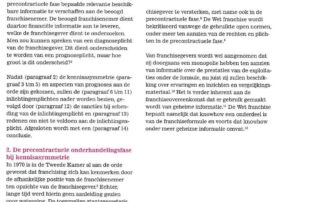Franchisee appeals in vain to incorrect prognosis
On March 4, 2015, the District Court of Zeeland-West-Brabant ruled in a case in which the franchisee is claiming compensation as a result of error in concluding the franchise agreement. The franchisee accuses the franchisor of concealing the fact that the company cannot generate a healthy entrepreneurial income. The franchisee believes that (at least) € 30,000 is a healthy income. The forecast assumes a lower entrepreneurial income. The franchisee also blames the franchisor for this the forecast of the wage costs is much too low because a wage cost percentage of around 20% is at issue in the branches operated by the franchisor itself and, according to the main retail trade board, a wage cost percentage of 18% is common in the outerwear sector.
With regard to the first allegation, the court that if the franchisee thinks that only an entrepreneurial income of € 30,000 is a healthy income, it should be clear to her from the forecasts that such an income was not foreseen. According to the court, there can be no question of error in this respect. In addition, both the business results achieved and the private withdrawals have been more than € 30,000 each year. If the information from the franchisor should be incorrect on these points, the correct, actually realized results are such as the franchisee believes they should be. In this respect, too, there can be no question of error.
With regard to the forecast of wage costs, the court finds that if the result actually achieved is lower than anticipated, it is relevant whether the budget contains a culpably incorrect forecast in parts. If the actual realized result is higher than anticipated, this is in principle irrelevant. After all, it is not plausible that the franchisee would not have entered into an agreement if he had known that, although the budgeted costs would be higher on one point, but also the operating result would be higher than budgeted, in such a way that the extra costs are more than absorbed. This situation arises in the case of a franchisee. That the franchisee, with a correct presentation, achieved it on all aspects actual result, the agreements would not have been entered into is not plausible. This could be different if the franchisee had informed the franchisor that the (correctness of the) forecast of the wage costs is of essential importance to it. That is not the issue.
Because the franchisee achieved a higher result than forecast, the court did not get round to assessing the forecast and its formation.
This ruling is a confirmation of existing case law, which means that an incorrect prognosis need not be taken for granted to lead to nullify the franchise agreement. It can also be concluded from the judgment that if the results achieved are higher than the prognosis, it is no longer relevant that the prognosis is incorrect and there is therefore no room for compensation.
Mr AC van Engel – Franchise lawyer
Ludwig & Van Dam Franchise attorneys, franchise legal advice. Do you want to respond? Mail to vanengel@ludwigvandam.nl

Other messages
Litigation as a franchisees association.
The Eye Wish Opticiens franchisees have recently filed opposition to ...
Between the franchisor’s diagnosis and forecasting duty
In the leading legal scientific journal WPNR, Mr. Dolphijn a ...
Franchise+ article: “Violation of a non-compete clause will cost the franchisee dearly.” – mr. C. Damen – September 23, 2021
The fact that the violation of a non-compete clause included ...
Article De Nationale Franchise Gids: “Unjustified cancellation by the franchisor: settle the bill.” – mr. C. Damen – dated September 20, 2021
The preliminary relief judge in Rotterdam recently ruled that the ...
Interview Mr. AW Doplphijn in Distrifood: “Legal consequences of merger Plus-Coop for entrepreneurs.” – dated September 12, 2021
"Dolphin hereby cites a theory that is also alive among ...
Supermarket Newsletter – No. 32 –
Supermarkets COOP and PLUS merge The intended merger will mean ...




